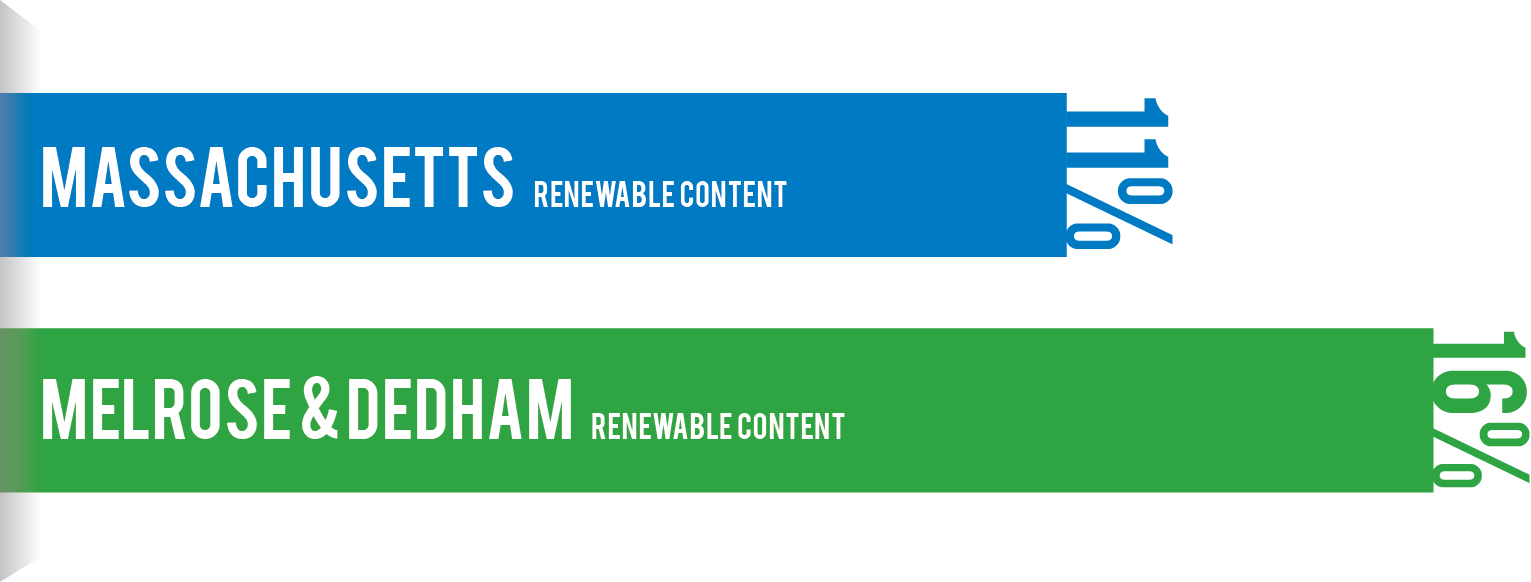Municipal Aggregation Comes to Rhode Island! Greener power at lower cost.
We're excited to announce the start of something good in Rhode Island. Seven cities and towns have adopted “green...
Many cities and towns around Massachusetts are getting into municipal aggregation, a community-wide, bulk purchase of electricity. But the City of Melrose and the Town of Dedham have taken the concept a step beyond all others. With the guidance of their consultant, Good Energy, Melrose and Dedham will be supplied with 16% local, post-1997 renewable energy instead of the 11% required by state law. That important 5% additional increment will be supplied by Mass Energy. The increase from 11% to 16% is actually a 45% increase in the amount of renewable energy!

Melrose and Dedham are medium-sized communities. It is estimated that by including an extra 5% renewable energy in their electricity supply, each community will be creating enough additional demand for green power to support a large wind turbine. Furthermore, consumers Melrose and Dedham will be given the opportunity to choose 100% renewable energy supplied by Mass Energy.
Starting January 1, 2016, consumers in both Melrose and Dedham will be receiving electricity from competitive power suppliers at a discount compared to Basic Service prices charged by National Grid (for Melrose) and Eversource (for Dedham). The additional renewable energy that Mass Energy will be suppling is enough to keep the town’s aggregated electricity price low while still sending a message that the state mandate on renewables could be stronger.
According to Philip Carr at Good Energy, “We worked with Mass Energy because they represented the best chance to leverage aggregation to stimulate demand for local renewable energy projects in the region. What’s unique about this approach is that with Community Electricity Aggregation, we can now bring local renewable energy into individual households at an affordable rate. It’s revolutionary!”
Mass Energy is pleased to work with Good Energy on a model that brings local renewable resources to the City of Melrose and the Town of Dedham. These communities will be getting green power from the same set of resources that supply members who are enrolled in New England Wind and New England GreenStart.

Information about the Melrose Community Energy Aggregation can be found here. Information about Dedham’s program can be found here.
We hope to provide these resources to other interested communities who follow suit. Currently, several communities are exploring the municipal aggregation model. The following is a partial list of MA communities – Arlington, Brookline, Lexington, Newton, Somerville, Sudbury, and Pittsfield.
As we have written here before, state mandates in Massachusetts and Rhode Island are effective at bringing more renewable energy onto the grid. However, current laws will not bring us to the level we need to reduce greenhouse gas emissions sufficiently. While we advocate for the essential expansion of these mandates, we also need to recognize the value of making voluntary purchases of green power. Voluntary purchases can be made at the individual or household level, but also on the community level.
In Massachusetts, we are making “green municipal aggregation” a priority activity. In Rhode Island, we see that the law allowing for municipal aggregation needs some serious tweaking in order to allow cities and towns in the Ocean State to benefit in the way that Bay State communities are now. We will be working on that issue with policymakers in Rhode Island.
Take Action
You can make a voluntary purchase of green power at the household level today. Make the switch and send a message to your community that more renewable energy is needed.
We're excited to announce the start of something good in Rhode Island. Seven cities and towns have adopted “green...
Earlier this month, Boston's Mayor Walsh called for cities around the country to explore a group purchase of...
Comments